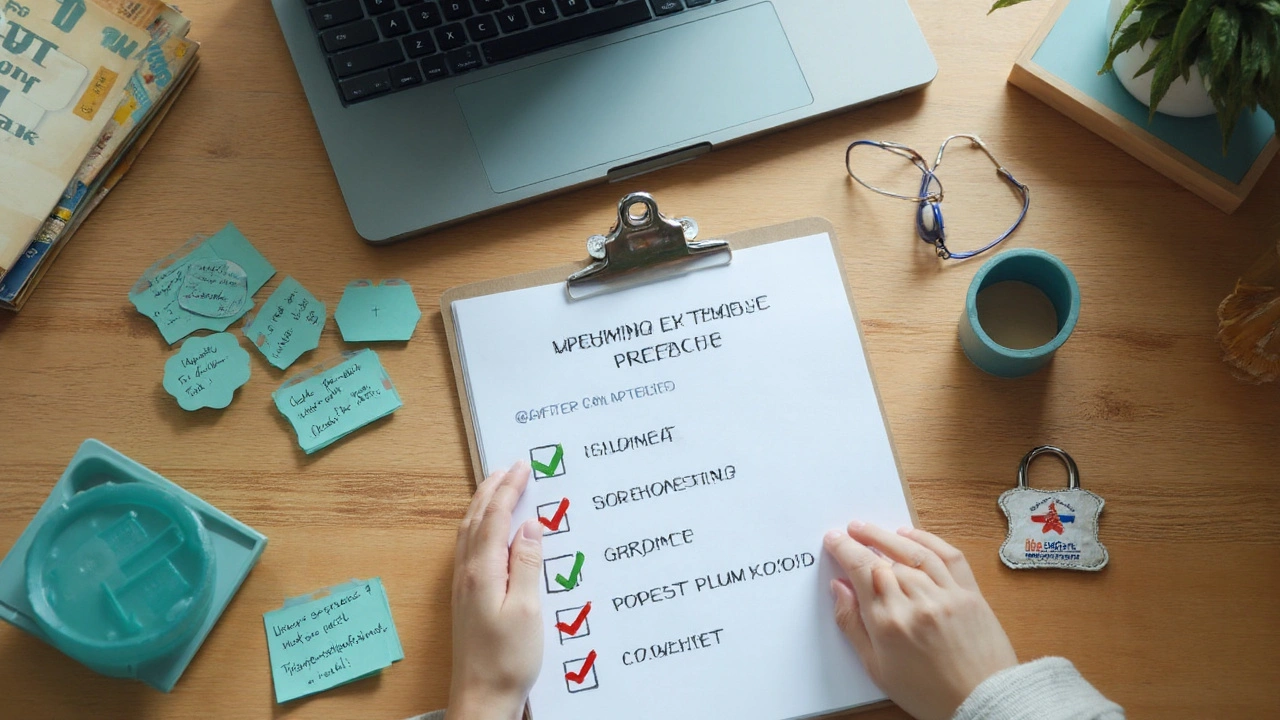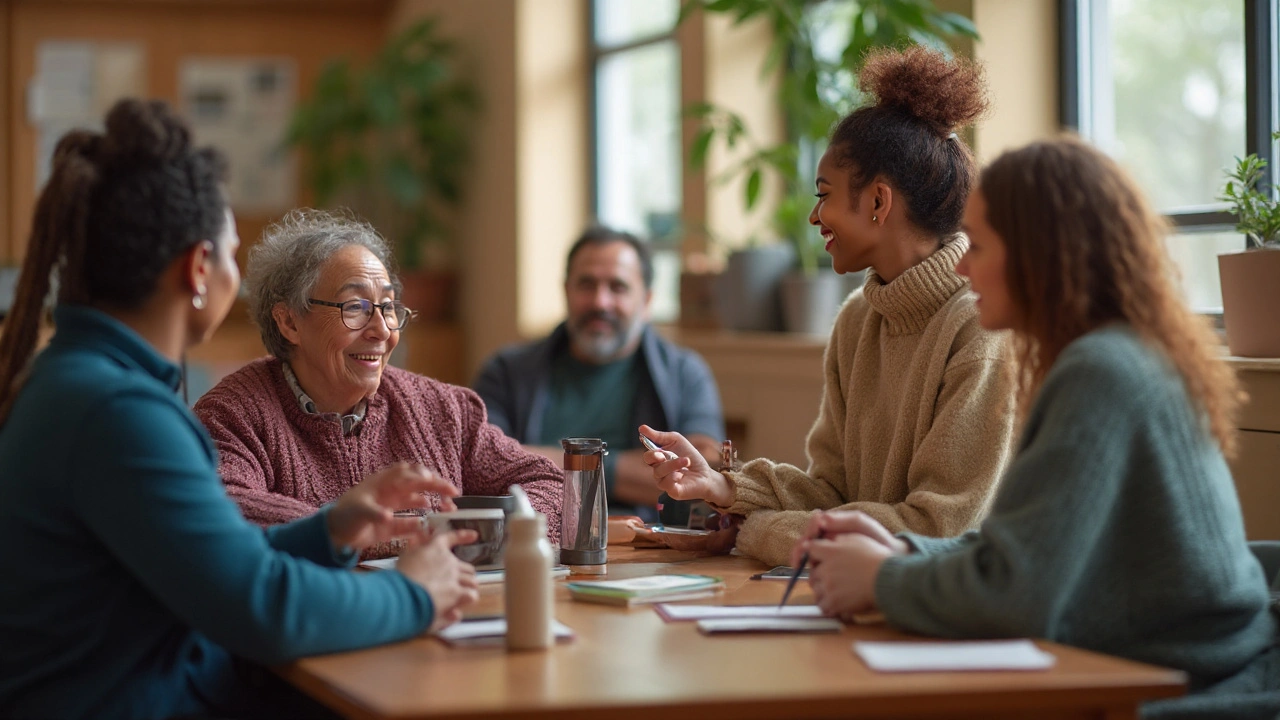Hypophosphatemia Support Groups (UK & Online): Find Help and Community

You can feel wildly alone when a blood test says your phosphate is low and your muscles ache for no clear reason. The science is messy, the causes are all over the map, and clinic time is short. Support groups fill the gaps-practical day-to-day tips, what actually helps, and a safe place to say, “I’m tired of being tired.” This guide shows you how to find the right community for hypophosphatemia, what to look for, and how to get help without drowning in noise. Expect clear steps, real examples, and UK-specific routes alongside global options.
TL;DR / Summary
- Not all hypophosphatemia is the same. Acute low phosphate (after illness, alcohol misuse, or refeeding) needs medical management, while genetic/chronic types (like XLH) benefit hugely from disease-specific groups and charities.
- Best places to start in the UK: your GP or specialist team, hospital Patient Advice and Liaison Service (PALS), condition charities (e.g., XLH UK, Metabolic Support UK), and large health communities (HealthUnlocked, RareConnect, Inspire).
- Vet any group: good moderation, clear rules, accurate info sources (NHS, NICE, Endocrine Society, UK Kidney Association), and zero pressure to buy supplements or share private data.
- Use groups for lived experience (energy pacing, pain coping, school/work accommodations) and for navigating care (referrals, burosumab access for XLH, dietitian input in refeeding).
- Red flags: miracle cures, supplement stacks without lab monitoring, admins DM’ing for money, and advice to ignore doctors-leave and report.
What you likely want to do next:
- Find a credible, active support group that fits your type of low phosphate.
- Ask smart first questions so you get useful replies.
- Learn what helped others with fatigue, bone pain, and muscle weakness.
- Figure out UK care pathways (who treats what, how to access therapies, how to escalate).
- Protect your privacy and your energy while you get support.
Step-by-step: How to find and join the right support group
1) Get clear on your “why” and your type
- Acute vs chronic: Acute hypophosphatemia often shows up with infections, diabetic ketoacidosis treatment, alcohol withdrawal, or refeeding after malnutrition. Chronic forms include XLH (X-linked hypophosphatemia), tumor-induced osteomalacia (TIO), and CKD-related phosphate issues.
- Severity quick guide (adult labs, mmol/L): mild 0.6-0.8, moderate 0.3-0.6, severe <0.3. Severe low phosphate can be dangerous (respiratory weakness, rhabdomyolysis, arrhythmia). Sources: BMJ Best Practice 2024, UpToDate 2025.
- Who usually treats it: Endocrinology/metabolic bone for XLH/TIO; nephrology for CKD-related issues; gastroenterology/dietetics for malabsorption/refeeding; oncology/surgery for TIO; general medicine in hospital for acute cases. In the UK, your GP coordinates referrals.
2) Ask your clinical team for vetted groups
- NHS clinics often know the best patient communities. Ask your GP, endocrinologist, nephrologist, or metabolic bone clinic for charity names and support forums.
- Use the hospital’s Patient Advice and Liaison Service (PALS) to request patient group info linked to your specialist service.
- For children with suspected or confirmed XLH, ask for a referral to a paediatric metabolic bone centre; they often connect families with peer support.
3) Search smart (UK & global)
- Platforms: HealthUnlocked (big UK presence), RareConnect (rare diseases), Inspire (broad health community), Facebook Groups (condition-specific), Reddit (r/rare_diseases, r/kidneydisease, r/AskDocs for general advice-but avoid personal medical advice there).
- Query templates: “hypophosphatemia group UK”, “XLH support group UK”, “tumor-induced osteomalacia community”, “refeeding syndrome support”, “low phosphate kidney disease forum”.
- Charities and alliances to look for: XLH UK, International XLH Alliance, Soft Bones (UK/US), Metabolic Support UK, Rare Disease UK, Kidney Care UK.
4) Vet group quality in five minutes
- Moderation: Are there active admins? Clear rules? Are misinformation and sales pitches removed?
- Evidence anchors: Do members cite NHS, NICE, Endocrine Society, UK Kidney Association, or peer-reviewed sources when discussing treatment?
- Safety: Are medical emergencies redirected to urgent care? Does the group forbid direct medical advice and encourage speaking to your clinician?
- Privacy: Closed group? Clear policies? Ability to post anonymously? No forced shares of lab reports or IDs.
- Culture: Are newcomers welcomed? Are carers included? Is there space for fatigue, pain, and mental health chats without judgment?
5) Join safely and set expectations
- Use a separate email for health communities if privacy matters to you. Review your social profiles before joining Facebook groups.
- Post a short intro: diagnosis (if known), key symptoms, one practical question. Example: “Adult with XLH in South Wales-how did you pace work during flares? Any luck with reasonable adjustments?”
- Keep medical decisions with your clinician. Use the group to gather questions, not to replace care.
6) Build your support “stack”
- One condition-specific group (e.g., XLH UK) + one broad community (e.g., HealthUnlocked kidney or bone health forum).
- Add a lived-experience group focused on fatigue/pain pacing (e.g., Long COVID pacing or chronic pain pacing communities) for practical energy management.
- Bookmark authoritative guidance: NHS pages on phosphate tests, NICE guidance on refeeding risk, UK Kidney Association resources, Endocrine Society statements on XLH/TIO.

Examples: Where support groups actually help
Quick scenarios to show how the right group changes the day-to-day.
Parent of a child with XLH
- Goal: Navigate school PE, growth monitoring, and treatment (including burosumab availability).
- Where to go: XLH UK, International XLH Alliance, Soft Bones UK. Parents share school letters, growth chart tracking, burosumab timelines in NHS specialised services.
- What to ask: “What helped your child manage PE? Did you use an Individual Healthcare Plan? How did you handle injections and travel?”
Adult with suspected tumor-induced osteomalacia (TIO)
- Goal: Find others who navigated PET scans, biopsy, and interim phosphate management.
- Where to go: RareConnect for TIO, Inspire bone health forums, disease-specific Facebook groups. Members often share imaging pathways and questions that helped them get targeted scans.
- What to ask: “If TIO was suspected, which imaging sequence did your team try first? How did you manage pain and fractures while waiting?”
Recovering after refeeding risk
- Goal: Understand the refeeding protocol and dietitian follow-up, avoid relapse or overcorrection.
- Where to go: Hospital dietetics team first; then moderated eating disorder recovery groups that allow medical topics but redirect clinical decisions to your team.
- What to ask: “What helped you remember phosphate/magnesium checks post-discharge? Any meal ideas that were easier on GI symptoms?”
CKD patient with low phosphate flags
- Goal: Balance kidney-friendly diet with bone health.
- Where to go: Kidney Care UK forums, HealthUnlocked kidney community.
- What to ask: “How do you talk with your renal dietitian about phosphate binders and bone pain? Any UK recipes that fit both needs?”
Runner with unexplained fatigue and low phosphate
- Goal: Avoid recurrent dips, check for underlying causes (nutrition, meds, alcohol, respiratory illness), and adjust training.
- Where to go: General health forums with strict moderation, sports medicine communities that allow lab talk with caution.
- What to ask: “Which questions helped your GP rule out causes? How did you pace training while labs normalised?”
Common aims across all scenarios
- Energy pacing and pain: People share timers, activity-then-rest cycles, mobility aids, and realistic work/school plans.
- Mental health: Peer support for health anxiety and uncertainty; pointers to counselling routes in the NHS and charity helplines.
- Care navigation: Sample referral letters, what to request (DEXA, fasting phosphate, FGF23 in suspected XLH/TIO), and how to use PALS to escalate.
| Group/Charity | Focus | Format | Region | How to join |
|---|---|---|---|---|
| XLH UK | X-linked hypophosphatemia (children & adults) | Website + private social groups + events | UK | Search "XLH UK"; ask your clinic or PALS for details |
| International XLH Alliance | Global umbrella for XLH groups | Information hub + links to local groups | Global | Search name; follow links to your country |
| Soft Bones (UK/US) | XLH and related hypophosphataemic conditions | Website, webinars, community | UK/US | Search "Soft Bones UK" or "Soft Bones" |
| Metabolic Support UK | Inherited metabolic disorders, signposting & peer support | Charity helpline + community links | UK | Search name; ask GP/clinic for referral |
| Rare Disease UK | Policy, patient voice, signposting | Resources + community campaigns | UK | Search name; join as patient/carer |
| Kidney Care UK / HealthUnlocked Kidney | CKD, dialysis, renal bone disease chat | Forums + peer support | UK | Search "HealthUnlocked Kidney" or "Kidney Care UK" |
| RareConnect | Rare disease communities (TIO, XLH topics) | Moderated forums | Global | Search "RareConnect hypophosphatemia" |
| Inspire | Broad health communities (bone/mineral) | Forums with moderation | Global | Search "Inspire bone health" |
| Facebook Groups (e.g., "XLH UK Support") | Condition-specific peer groups | Private groups | UK/Global | Search Facebook; check privacy rules carefully |
Note on credibility: Good groups align with guidance from NHS and NICE on tests and pathways; Endocrine Society statements on XLH/TIO; UK Kidney Association advice on CKD mineral metabolism; and evidence summaries (BMJ, UpToDate).
Checklists and cheat-sheets
What to ask your doctor (pick two to start)
- What’s the suspected cause of my low phosphate? Acute, chronic, or genetic?
- Which labs should we track and how often? (Phosphate, calcium, vitamin D, PTH, magnesium, ALP; FGF23 if XLH/TIO suspected.)
- Should I see endocrinology, nephrology, or a metabolic bone clinic? Can you refer me?
- If XLH is suspected, can we discuss burosumab eligibility and referral timelines in NHS specialised services?
- Any medications or alcohol use that could be lowering phosphate for me?
- Dietitian referral: what should I eat while we sort this out-any restrictions I should follow now?
First post template (copy/paste)
- “Hi, I’m [first name], [age], in [region]. My phosphate was [value] mmol/L. Diagnosed/suspected [cause]. My biggest daily struggle is [fatigue/muscle weakness/pain]. What worked for you with [one problem]? Thanks!”
Safety and privacy checklist
- Never share full lab reports with identifiers; crop or redact.
- Don’t send money or buy products through DMs.
- Be cautious with supplement advice (phosphate, vitamin D, magnesium) without lab monitoring and clinician oversight.
- If you feel pressured or judged, leave. Your energy is precious.
Emergency signs (seek urgent medical care):
- Severe muscle weakness, difficulty breathing, chest pain, confusion, or seizures.
- Recent refeeding after malnutrition and sudden worsening symptoms.
- Phosphate reported as “severely low” (e.g., <0.3 mmol/L) with symptoms. Sources: NHS acute care, BMJ Best Practice 2024.
Quick UK pathways
- GP → bloods and initial work-up → referral to endocrinology/nephrology/metabolic bone clinic depending on cause.
- PALS → helps with clinic info, wait times, and signposting to patient groups.
- For children with XLH → paediatric endocrinology/metabolic bone centre; school Individual Healthcare Plan; check burosumab access.
Decision hints
- If your low phosphate is tied to CKD → prioritise kidney community + renal dietitian advice.
- If lifelong bone pain, short stature, dental abscesses → check XLH groups; ask about FGF23 testing and family screening.
- If adult with fractures and very low phosphate without clear cause → explore TIO discussions; ask your clinician about imaging sequences.
- If recovering from an eating disorder or prolonged malnutrition → follow your dietetic plan; use recovery communities for accountability and practical coping.

Mini-FAQ and next steps
What exactly is hypophosphatemia?
It means your blood phosphate is low. Phosphate helps with energy (ATP), bones/teeth (hydroxyapatite), and muscle/nerve function. Mild dips are common during illness and usually settle. Moderate to severe cases can cause weakness, bone pain, fractures, confusion, and breathing problems. Sources: Endocrine Society educational materials, BMJ Best Practice 2024.
What causes it?
Common buckets: decreased intake/absorption (malnutrition, vitamin D deficiency, GI disorders), shifts into cells (refeeding, insulin, respiratory alkalosis), increased loss (kidneys losing phosphate-e.g., XLH, TIO, certain meds, alcohol-related tubular issues), and CKD-related mineral problems. Medications like antacids containing aluminium/magnesium, some diuretics, and chemotherapy agents can be factors.
Who treats it in the UK?
Start with your GP. They’ll refer to endocrinology for XLH/TIO/metabolic bone; nephrology for CKD; dietetics/gastroenterology if malabsorption or refeeding risk. Many hospitals have specialist metabolic bone clinics.
Is phosphate supplementation safe?
Only under medical advice. Too much can cause calcium problems and kidney issues. Clinicians often correct magnesium and vitamin D at the same time because low magnesium can keep phosphate low. Sources: UpToDate 2025, UK Kidney Association practice resources.
What about burosumab?
In the UK, burosumab is commissioned for eligible XLH patients via specialised services. Patient groups (XLH UK, Soft Bones) often share experiences with referral criteria, injection schedules, and travel planning.
How often should I check labs?
It depends on cause and treatment. Acute cases may need frequent checks (daily in hospital). Stable chronic conditions might be every 3-6 months, adjusted by your clinician. Ask specifically about phosphate, calcium, PTH, ALP, vitamin D, and magnesium.
Can support groups replace medical care?
No. Use them to gather questions, get daily-life tips, and feel less alone. Keep treatment decisions with your clinician.
What if there’s misinformation in a group?
Flag it to moderators with a short note and a source (e.g., NHS, NICE). If nothing changes or you feel unsafe, leave and choose a better-moderated community.
How do I handle work or school?
Ask about reasonable adjustments: flexible hours, rest breaks, remote options, reduced PE for children during flares, and assistive equipment. Groups often share sample letters and tips on talking to HR or schools.
Next steps by situation
- Newly diagnosed adult: Book a GP follow-up to clarify the cause; ask for appropriate referrals; join one vetted condition group plus one broad forum; write down three questions before each appointment.
- Parent/carer: Request school Individual Healthcare Plan; ask your clinic about XLH-specific resources; connect with a parent-led group for day-to-day hacks.
- CKD-related issues: Prioritise renal team advice; discuss phosphate binders and bone health; join a kidney community for recipes and fatigue pacing tips.
- Refeeding risk: Stick to your dietetic plan; avoid crowdsourced supplement advice; lean on recovery groups for structure and accountability.
- Suspected TIO: Push for coordinated imaging and endocrinology input; use rare disease communities for question lists and coping tips while you wait.
Troubleshooting
- No group seems to fit: Join a broad rare disease community (RareConnect), search for symptom-based groups (bone pain, chronic fatigue) while you wait for a firm diagnosis.
- Group makes you anxious: Mute notifications; check in weekly; choose a smaller, moderated space; ask moderators for a starter thread.
- Energy budget is tiny: Lurk first; save key posts; ask one practical question each week-quality over quantity.
Why this matters: A good support group won’t fix low phosphate on its own, but it will cut through noise, lift some of the emotional load, and help you act on the right things at the right time. Blend it with solid clinical care, and you’ll get further, faster.


Darrell Wardsteele
Look, before you jump into any hypophosphatemia forum, make sure the admins actually pull info from the NHS or NICE. I’ve seen groups that post half‑baked advice and then blame you when things go sideways. If a post mentions “miracle cure” or sells supplements, that’s a red flag-no credible source backs that up. Also, check that the moderation policy is clear and that spam gets nuked fast. A quick scan of the “About” page usually tells you if they’re legit or just a marketing front.
Madeline Leech
People need to stop glorifying unverified treatments and think about the real victims who suffer because of misinformation. If a group pushes a supplement stack without lab monitoring, that’s not just risky, it’s downright irresponsible. The right move is to stick to evidence‑based guidance and call out anyone who tries to sell you snake oil.
Barry White Jr
Joining a vetted UK group saves you a lot of hassle.
Andrea Rivarola
Reading through the guide reminded me how fragmented the support landscape really is, especially when you’re trying to sort out whether your low phosphate is acute or chronic. I’ve spent weeks scrolling through multiple forums, and the first thing I noticed was the sheer number of duplicate threads asking the same basic questions about lab values. It’s frustrating to see newcomers repeatedly asking “what does 0.4 mmol/L mean?” when the answer is already pinned in the sidebar of most reputable groups. That’s why a clear “starter post” template, like the one you included, is such a lifesaver-it cuts down the noise and lets moderators focus on more nuanced discussions. Another point that stood out to me was the emphasis on checking whether a group’s moderators actually cite reputable sources; I’ve been burned before by well‑meaning members who quoted outdated blog posts instead of NHS guidelines. The checklist you provided for vetting groups is spot‑on, especially the part about privacy and forced data sharing; I’ve seen people get asked for full lab reports with personal identifiers and that’s just a privacy nightmare. When you talk about “energy pacing,” it resonates because fatigue is the silent killer in many low‑phosphate cases, and practical tips like using timers or the “30‑minute rule” can be a game‑changer. I also appreciate the nod to mental health support-having a space to vent about health anxiety without judgment makes a huge difference in long‑term coping. The section on UK pathways really helped me map out the steps from GP to specialist, and I now know to ask for a referral to a metabolic bone clinic if my labs stay abnormal. One thing I’d add is a quick tip on how to request a copy of your own medical records; many patients aren’t aware they have that right, and it can empower them when navigating multiple specialists. The mention of PALS as a resource is something I hadn’t considered before, but it makes sense to have a backup when clinic appointments are hard to get. I was also glad to see the advice on using separate emails for health communities-spam and phishing attempts are way too common these days. Overall, the guide feels like it was written by someone who’s been in the trenches, and that authenticity shines through every section. If I had to suggest an improvement, maybe a quick FAQ on how to interpret FGF23 results for those suspecting XLH or TIO would round it out nicely. Thanks for putting together something that feels both comprehensive and compassionate.
Tristan Francis
Sounds good but remember that many of those “official” groups are funded by pharma and they push the same drug agenda. They want you to trust the brand and ignore other options, so keep an eye out for hidden sponsorship. Also the NHS data they quote can be cherry‑picked, so double‑check any claim before you follow it.
Keelan Walker
Totally hear you Tristan 👍 keep it real and stay safe 🙏 remember to trust your gut and the community vibes 🌟 you’ve got this 🚀